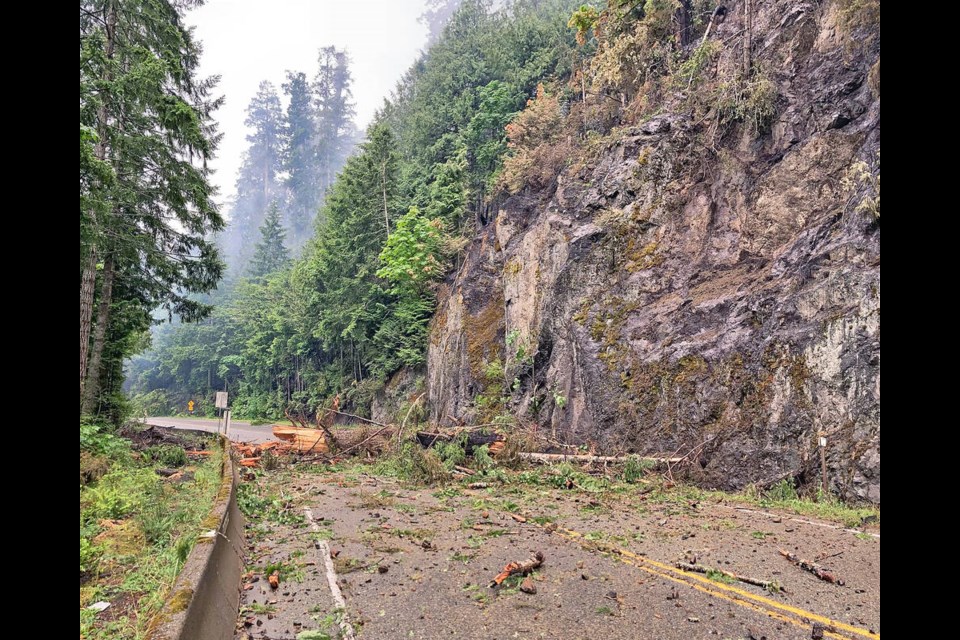Highway 4 is not expected to be open again to motorists until at least June 24, and even then it will be for single-lane alternating traffic only at first, the Transportation Ministry says.
The ministry said crews are working flat-out to prepare for a staged reopening after the highway was shut down June 6 because of debris, including trees, falling from the Cameron Bluffs wildfire.
The shutdown has cut off paved road access to west coast communities such as Port Alberni, Ucluelet and Tofino.
Only an unpaved forest service route via Lake Cowichan is available to motorists who need to get to and from the west coast.
Provincial officials say it could be mid-July before the highway linking the east and west coasts of Vancouver Island is fully reopened.
A temporary load-bearing wall is expected to be built on the eastbound side of the highway to catch debris, along with metal mesh netting held by cranes to block falling rocks and burned trees.
Debris continues to plummet down the steep slope above the 1.5-kilometre stretch of highway most affected by the 254-hectare fire, the ministry said, noting trees destroyed by the fire and rocks the size of coffee mugs were continuing to crash down on Tuesday.
Assessors are working on a steep slope above the closed portion of the highway to determine what trees need to be taken out to make the highway safe, the ministry said.
“Although this section of highway is relatively short, the impact of the fire has been significant,” Transportation Minister Rob Fleming said Tuesday, stressing that the reopening dates are only targets.
“The mountain side above the highway is incredibly steep and the site is extremely challenging for both wildfire crews and ministry staff and contractors.”
Fleming said while the closure has created “major challenges” for area residents, businesses and tourists, the road cannot be reopened until it is safe.
Geotechnical engineers are examining the steep slope above the highway, said the minister, who called it “very dangerous” work. “They need to make sure that the cliff face is stable.”
So far, nearly two dozen trees — some a metre in diameter — have fallen on the highway, coming down unpredictably, said Janelle Straite, deputy director of transportation and infrastructure in the south coast region.
Road pavement is intact despite the heavy debris, she said, although some pieces of the roadside’s barrier were dislodged and need repair.
Assessment of trees along the slope started Monday and continued Tuesday on the “very, very challenging topography,” she said, adding debris on the slope has been loosened by the fire.
Rain is forecast for later in the week, which could slow the assessment work, she said.
A number of trees have been marked to be removed, and falling rock is being monitored daily to “assess where those trends are happening,” Straite said.
Equipment is on standby on the site, ready to begin moving some of the trees that have fallen onto the road.
One positive sign is that fewer hazards are dropping onto the highway, she said. “We are starting to understand where those rocks are coming from in a more predictable manner.”
Slope stabilization materials are either on site or on their way, and are expected to take about five days to install, Straite said.
The area will continue to be monitored for about two weeks before the highway reopens fully, she said.
Meanwhile, Donna MacPherson, fire information officer with the Coastal Fire Centre, said high winds could make wildfires “more active” Tuesday evening. “There was some precipitation in the last previous days, but whatever fell — and it wasn’t everywhere — it’s pretty much gone now.”
Noelle Kekula, information officer with the incident management team for the Cameron Bluffs fire, said firefighters have been preparing containment measures in anticipation of the high winds forecast for much of the south Island on Tuesday and Wednesday.
“Residents that live on Cameron Lake, they may see active fire tonight,” Kekula said Tuesday. “But when you see that, know that it’s high probability that it’s within our containment lines.”
Kekula said forest recreation users should be mindful of the Vancouver Island campfire ban to avoid adding more human-caused fires.
— With a file from Michael J. Lo
>>> To comment on this article, write a letter to the editor: [email protected]





